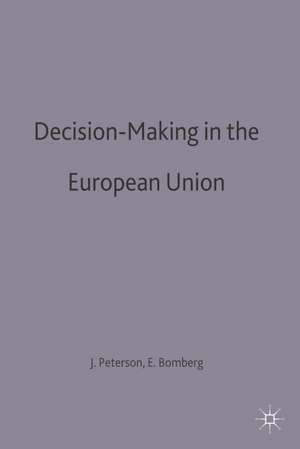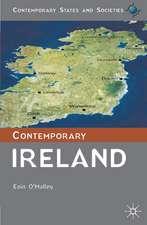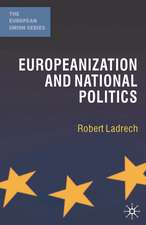Decision-Making in the European Union: The European Union Series
Autor John Peterson, Elizabeth Bombergen Limba Engleză Paperback – 20 mai 1999
Din seria The European Union Series
- 10%
 Preț: 266.43 lei
Preț: 266.43 lei - 12%
 Preț: 231.01 lei
Preț: 231.01 lei - 18%
 Preț: 256.59 lei
Preț: 256.59 lei -
 Preț: 265.76 lei
Preț: 265.76 lei - 30%
 Preț: 774.12 lei
Preț: 774.12 lei -
 Preț: 263.72 lei
Preț: 263.72 lei - 30%
 Preț: 776.58 lei
Preț: 776.58 lei - 12%
 Preț: 226.42 lei
Preț: 226.42 lei - 18%
 Preț: 257.50 lei
Preț: 257.50 lei -
 Preț: 265.47 lei
Preț: 265.47 lei - 17%
 Preț: 256.89 lei
Preț: 256.89 lei - 6%
 Preț: 239.59 lei
Preț: 239.59 lei - 14%
 Preț: 198.22 lei
Preț: 198.22 lei - 17%
 Preț: 240.98 lei
Preț: 240.98 lei - 12%
 Preț: 237.31 lei
Preț: 237.31 lei - 13%
 Preț: 232.17 lei
Preț: 232.17 lei - 13%
 Preț: 251.28 lei
Preț: 251.28 lei - 31%
 Preț: 772.74 lei
Preț: 772.74 lei -
 Preț: 268.68 lei
Preț: 268.68 lei -
 Preț: 258.89 lei
Preț: 258.89 lei - 18%
 Preț: 270.20 lei
Preț: 270.20 lei - 14%
 Preț: 832.17 lei
Preț: 832.17 lei -
 Preț: 265.18 lei
Preț: 265.18 lei - 18%
 Preț: 271.40 lei
Preț: 271.40 lei - 22%
 Preț: 273.24 lei
Preț: 273.24 lei -
 Preț: 271.58 lei
Preț: 271.58 lei -
 Preț: 269.94 lei
Preț: 269.94 lei - 14%
 Preț: 771.75 lei
Preț: 771.75 lei -
 Preț: 320.93 lei
Preț: 320.93 lei - 21%
 Preț: 280.55 lei
Preț: 280.55 lei -
 Preț: 263.92 lei
Preț: 263.92 lei - 18%
 Preț: 271.14 lei
Preț: 271.14 lei - 16%
 Preț: 259.19 lei
Preț: 259.19 lei -
 Preț: 270.49 lei
Preț: 270.49 lei - 18%
 Preț: 269.76 lei
Preț: 269.76 lei - 14%
 Preț: 775.19 lei
Preț: 775.19 lei - 22%
 Preț: 269.76 lei
Preț: 269.76 lei - 14%
 Preț: 270.20 lei
Preț: 270.20 lei
Preț: 266.85 lei
Nou
51.06€ • 53.46$ • 42.25£
Carte tipărită la comandă
Livrare economică 05-19 aprilie
Specificații
ISBN-10: 033360492X
Pagini: 336
Dimensiuni: 155 x 235 x 19 mm
Greutate: 0.5 kg
Ediția:1999
Editura: Bloomsbury Publishing
Colecția Red Globe Press
Seria The European Union Series
Locul publicării:London, United Kingdom
Caracteristici
Notă biografică
JOHN PETERSON is Jean Monnet Professor of European Politics, University of Glasgow.ELIZABETH BOMBERG is Lecturer in Politics, University of Edinburgh.The authors were Visiting Lecturers at the Institute of Governmental Studies, University of California, Berkeley, while writing this book.
Cuprins
Introduction Making Sense of EU Decision-Making Institutions, Rules, Norms The Internal Market External Trade Policy The Common Agricultural Policy Cohesion Policy Environmental Policy Research and Technology Policy The Common Foreign and Security Policy Conclusion.
Descriere
Based on exhaustive research, this book explains how the European Union makes decisions in seven major policy sectors. Written in a clear, user-friendly style, it brings the EU alive for a student and non-specialist audience. The book's central themes are that informal norms often matter more than formal rules, agency often matters more than structure, and abrupt change often punctuates deadlock. It offers a theoretically-based introduction to the lively, humorous and fascinating politics of a unique experiment in modern governance.





